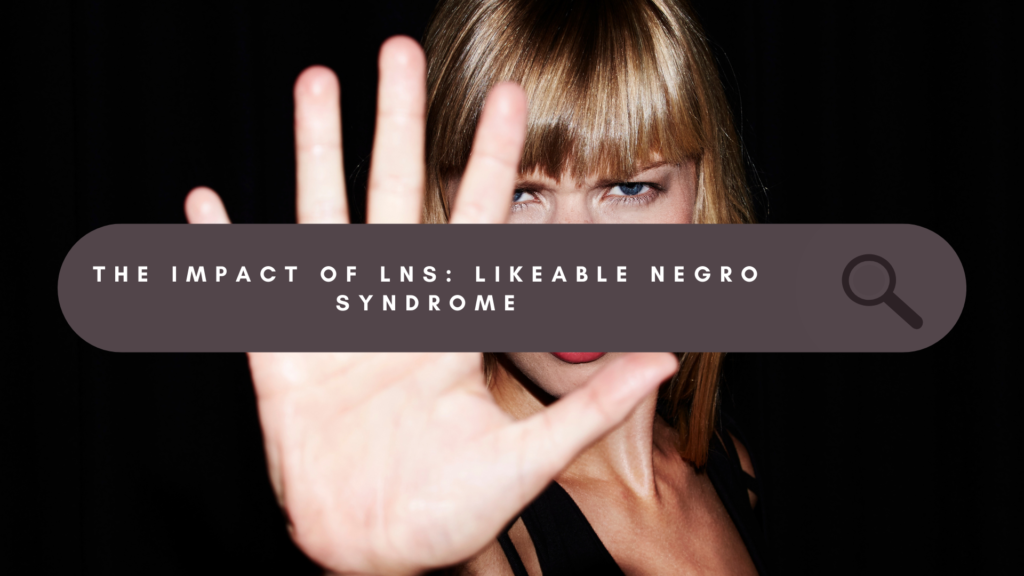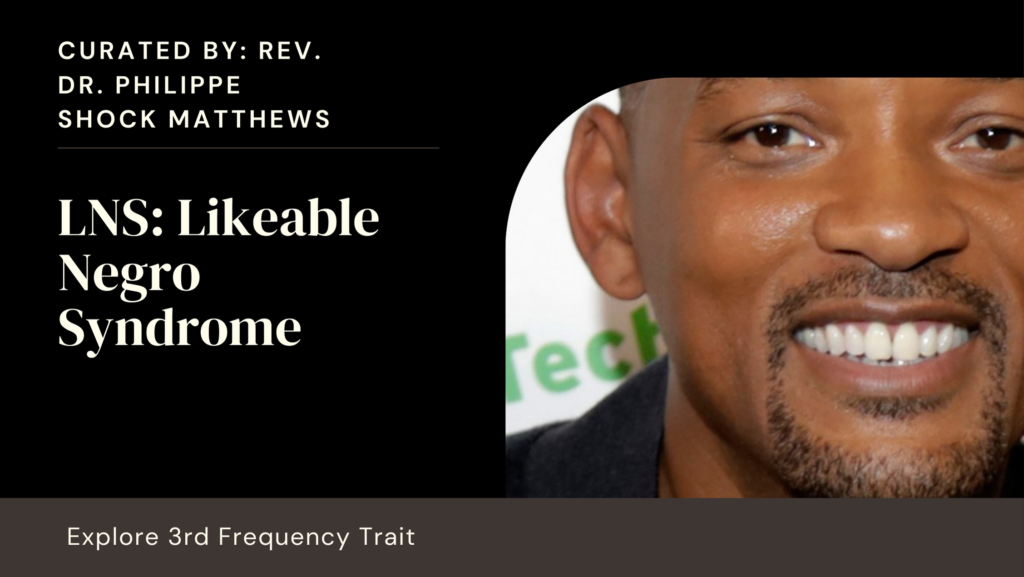
Researched and Curated By Rev. Dr. Philippe SHOCK Matthews
(Black Trauma and Mental Health Specialist | Prompt Eng | GPT Dev | Research Scientist | Africana Phenomenologist)

The Likable Negro Syndrome (LNS) is a concept that refers to the social and psychological phenomenon where Black individuals feel pressured to conform to behaviors, attitudes, and appearances that are deemed non-threatening, agreeable, and acceptable to the dominant (usually White) culture. This syndrome encapsulates a survival mechanism that Black people often adopt to navigate and succeed in predominantly White spaces, such as workplaces, schools, and other institutions.
Key Aspects of the Likable Negro Syndrome:
1. Conformity and Assimilation:
– Black individuals may need to suppress aspects of their cultural identity and expression to fit into the mainstream norms. This can involve altering their speech, dress, and hairstyles and even minimizing discussions about race and racism to avoid discomfort among their White peers.
2. Emotional Labor:
– A significant amount of emotional labor is involved in constantly managing one’s demeanor to appear non-threatening and amiable. This can lead to a superficial portrayal of one’s true self, masking genuine emotions and experiences to maintain social harmony.
3. Stereotype Management:
– To counteract negative stereotypes, Black people may overcompensate by adopting an exceptionally polite, agreeable, and accommodating persona. This is done to challenge prejudiced notions and prove their worthiness and competence.
4. Impact on Mental Health:
– The chronic need to present oneself in a likable and non-threatening manner can take a toll on mental health. It can lead to internalized stress, anxiety, and a sense of inauthenticity. This constant vigilance and self-monitoring can result in burnout and emotional exhaustion.
5. Historical Context:
– The roots of this syndrome can be traced back to slavery and segregation, where survival often depended on being perceived as non-threatening and subservient. These historical dynamics have evolved but persist in modern racial dynamics and power structures.
6. Microaggressions and Tokenism:
– microaggressions and tokenism often reinforce LNS in professional and social settings. Black individuals may be singled out to showcase diversity, but only as long as they conform to the expected likable persona. Failure to do so can result in social ostracization or professional repercussions.
Understanding and Addressing Likable Negro Syndrome
To address LNS, it is crucial to foster environments where Black individuals feel safe and supported to express their authentic selves without fear of retribution or marginalization. This involves:
– Cultural Competency and Sensitivity Training: Educating non-Black individuals about the pressures and challenges Black people face in predominantly White spaces.
– Promoting Inclusivity: Creating policies and practices that value diversity and inclusion beyond token representation, encouraging genuine acceptance and celebration of different cultural identities.
– Mental Health Support: Providing accessible mental health resources that acknowledge and address the unique stressors associated with LNS.
– Empowerment and Advocacy: Encouraging Black individuals to embrace their true selves and advocating for systemic changes that reduce the need for such survival mechanisms.
By acknowledging and addressing the Likable Negro Syndrome, society can move towards a more inclusive and equitable environment where all individuals can thrive authentically.
The “Likable Negro Syndrome” (LNS) is a trope that refers to a recurring narrative portrayal of Black characters in media as overly ingratiating, self-deprecating, or de-masculinized to derive their likeability and appeal from being non-threatening to white audiences.
Some key characteristics of the LNS trope include:
- Black characters are portrayed as subservient, passive, or lacking agency to avoid appearing too empowered or “uppity.”
- Their personalities and behaviors are shaped to make them palatable and relatable to the presumed white mainstream audience.
- They often serve as comic relief or the “sassy best friend” archetype rather than fully developed protagonists.
- Their storylines and character arcs revolve around helping or validating white lead characters.
The trope is considered problematic as it perpetuates racist stereotypes, denies Black characters full humanity and complexity, and prioritizes the comfort of white viewers over authentic Black representation. Scholars, critics, and audiences have criticized it for promoting an assimilationist view that Black people must conform to white expectations to be deemed acceptable.
Is LNS Another Form of Fawning Trauma?
Yes, the Likable Negro Syndrome can be considered a form of “fawning” trauma response. In the context of trauma responses, “fawning” refers to a behavior where individuals respond to threats by excessively pleasing, appeasing, or accommodating others to avoid conflict or harm. This concept is part of the “fight, flight, freeze, fawn” framework that describes how people react to traumatic or stressful situations.
Connection Between Likable Negro Syndrome and Fawning:
1. Survival Mechanism:
– Both the Likable Negro Syndrome and the fawn response are rooted in the need for survival. Historically, Black individuals adopted these behaviors to avoid physical harm, social ostracism, or economic repercussions in environments dominated by oppressive racial dynamics.
2. Avoidance of Conflict:
– Fawning involves avoiding conflict or danger by becoming agreeable and accommodating. Similarly, Black individuals exhibiting the Likable Negro Syndrome often downplay their own needs, suppress their authentic selves, and adhere to behaviors that make them appear non-threatening to the dominant culture.
3. Emotional Labor and Suppression:
– Both involve significant emotional labor. The constant need to manage one’s behavior and emotions to please others leads to the suppression of true feelings, contributing to stress, anxiety, and emotional exhaustion.
4. Internalized Stress and Anxiety:
– The ongoing pressure to maintain a likable persona can result in chronic stress and anxiety. This mirrors the psychological toll seen in fawn individuals, as they prioritize others’ comfort and approval over their well-being.
5. Historical and Social Context:
– The historical context of racial oppression and the need for Black people to navigate predominantly White spaces safely has reinforced these fawning behaviors. This is a social adaptation to systemic racism and discrimination, where being perceived as likable or non-threatening can be a strategy to minimize harm and gain acceptance.
Addressing and Healing from Fawning Trauma:
To address the trauma associated with fawning behaviors like those seen in the Likable Negro Syndrome, it is important to:
1. Promote Self-Awareness and Authenticity:
– Encouraging individuals to recognize and validate their feelings, needs, and identities without the pressure to conform to others’ expectations.
2. Create Supportive Environments:
– Fostering safe spaces where Black individuals can express themselves authentically without fear of retribution or judgment. This includes workplaces, educational institutions, and social settings.
3. Cultural Competency and Education:
– Educating non-Black individuals about the historical and contemporary pressures that lead to fawning behaviors. This can help reduce the expectation for Black people to conform to likable personas.
4. Mental Health Resources:
– Providing access to culturally sensitive mental health resources that understand and address the specific challenges related to fawning trauma responses.
5. Advocacy and Systemic Change:
– Working towards systemic changes that reduce the need for survival mechanisms like fawning. This includes promoting diversity, equity, and inclusion at all levels of society.
Understanding the Likable Negro Syndrome as a form of fawning trauma response highlights the need for a compassionate and comprehensive approach to healing and empowerment within the Black community.

The Will Smith Likable Syndrome
Public Persona and Societal Expectations:
1. Career in Entertainment:
– Will Smith’s career in the entertainment industry has often required him to navigate predominantly White spaces. His roles in television, movies, and music have sometimes necessitated the adoption of a widely appealing and non-threatening persona to a broad audience.
2. Maintaining a Likable Image:
– a friendly, charming, and approachable demeanor frequently characterizes Smith’s public image. This aligns with the concept of the Likable Negro Syndrome, where Black individuals feel pressured to conform to a likable and agreeable persona to gain acceptance and success.
3. Impact on Personal Identity:
– The need to maintain such an image can lead to internal conflict and emotional labor. Balancing personal authenticity with public expectations can be challenging and might contribute to stress and anxiety.
4. Public Incidents:
– Public incidents, such as Smith’s altercation at the Oscars in 2022, may reflect the complexities and pressures of maintaining a public persona. Such events can indicate underlying stress and the emotional toll of living up to societal expectations.
Broader Context:
– Historical and Social Dynamics:
– The pressures faced by Smith are part of a broader historical and social context where Black individuals, particularly those in the public eye, have often had to navigate complex dynamics of race and acceptance. The need to be seen as likable and non-threatening is a survival mechanism rooted in systemic racism.
Addressing the Pressures:
For public figures and Black individuals more broadly, addressing the pressures of the Likable Negro Syndrome involves several strategies:
1. Authentic Self-Expression:
– Encouraging and supporting authentic self-expression without conforming to externally imposed expectations.
2. Mental Health Support:
– Providing access to mental health resources that understand and address the unique pressures faced by Black individuals in the public eye.
3. Cultural Competency:
– Promoting cultural competency and awareness among audiences and within the entertainment industry to reduce the pressure on Black individuals to conform to likable personas.
4. Advocacy and Change:
– Advocating for systemic changes within industries and society to create more inclusive and supportive environments where Black individuals can thrive authentically.
It is clear that the pressures associated with the Likable Negro Syndrome are prevalent in many Black individuals’ experiences, particularly those in high-profile positions. Understanding and addressing these pressures is crucial for promoting mental health, authenticity, and equity.
Will Smith On Being Likable
“I’ve trained myself to illuminate the things in my personality that are likable and to hide and protect the things that are less likable.”[2] This quote suggests that Smith consciously tries to emphasize his likable traits while downplaying less appealing aspects of his personality.
Some key traits that make people likable, according to the sources:
– Empathy and kindness[2]
– Strong listening skills[2]
– Eye contact and smiling[2]
– Being authentic and honest[2]
– Having a good sense of humor[2]
Smith exemplifies some of these traits through quotes like:
“Let your smile change the world. Don’t let the world change your smile.”[1][3]
“Never underestimate the pain of a person, because in all honesty, everyone is struggling. Some people are just better at hiding it than others.”[1] This shows empathy.
“If you don’t fight for what you want, don’t cry for what you lost.”[1] This quote promotes authenticity.
The article [2] states “I believe if we all focus on what makes us more likable, we will spread that positivity to others. We will see more success in our businesses, careers and personal lives.”[2] It suggests Smith deliberately cultivates likability for its benefits.
The key insights from Will Smith on being likable emphasize being kind, empathetic, authentic, humorous and focusing on one’s most appealing personality traits while minimizing negative qualities.[1][2]
Citations:
- [1] https://addicted2success.com/quotes/56-inspirational-will-smith-quotes/
- [2] https://www.tennessean.com/story/money/careers/2018/07/06/smith-inspires-lessons-being-likable/761619002/
- [3] https://www.successconsciousness.com/blog/quotes/will-smith-quotes/
- [4] https://www.boredpanda.com/will-smith-quotes/
- [5] https://www.goodreads.com/author/quotes/598671.Will_Smith
The Impact of LNS
The Likable Negro Syndrome (LNS) exerts significant psychological, emotional, and social pressures on Black individuals. These pressures stem from the need to conform to expectations that make them appear non-threatening, agreeable, and accommodating to the dominant culture. Here are some specific ways this pressure manifests:
Psychological Pressure:
1. Identity Suppression:
– Individuals may feel compelled to suppress aspects of their cultural identity, speech patterns, and personal preferences to fit into a more palatable image. This can lead to a diminished sense of self and internal conflict.
2. Constant Self-Monitoring:
– Monitoring and adjusting one’s behavior to align with societal expectations can be mentally exhausting. This hyper-vigilance can lead to anxiety and stress.
3. Imposter Syndrome:
– Feeling like an imposter is common among those experiencing LNS, as they may believe their success is contingent on their ability to conform rather than their actual abilities and merits.
Emotional Pressure:
1. Emotional Labor:
– Maintaining a likable persona involves significant emotional labor, including suppressing genuine feelings and reactions. This can lead to emotional exhaustion and burnout.
2. Fear of Rejection:
– There is a pervasive fear of rejection or marginalization if one’s true self is revealed. This fear can lead to chronic stress and a reluctance to form genuine connections with others.
3. Internalized Racism:
– The constant pressure to conform to White standards of acceptability can result in internalized racism, where individuals begin to adopt and perpetuate negative stereotypes about their race.
Social Pressure:
1. Tokenism:
– Black individuals may be placed in token roles, expected to represent their entire race while conforming to the likable persona. This can lead to isolation and a lack of genuine support networks.
2. Limited Authentic Relationships:
– Forming authentic relationships can be challenging when one’s interactions are dictated by the need to be likable. This can lead to superficial connections and a lack of deep, meaningful relationships.
3. Professional Constraints:
– In professional settings, the pressure to be likable can limit opportunities for authentic leadership and self-expression. It can also impact career advancement if one is perceived as only fitting a supportive role rather than a leadership one.
Impact on Mental Health:
1. Chronic Stress and Anxiety:
– The ongoing need to present a likable image can result in chronic stress and anxiety, impacting overall mental health and well-being.
2. Depression:
– The dissonance between one’s true self and the likable persona can lead to feelings of hopelessness, sadness, and depression.
3. Burnout:
– The emotional and psychological toll of maintaining this facade can lead to burnout, characterized by extreme fatigue, detachment, and reduced personal accomplishment.
Addressing the Pressures of LNS:
1. Cultural Affirmation:
– Encouraging and affirming Black cultural identities can help individuals feel more comfortable expressing their true selves without fear of rejection.
2. Safe Spaces:
– Creating safe spaces where Black individuals can express themselves authentically without the need to conform can alleviate some of the pressures associated with LNS.
3. Mental Health Support:
– Providing access to culturally competent mental health professionals who understand the unique challenges faced by Black individuals can help address the psychological and emotional impacts of LNS.
4. Advocacy and Education:
– Promoting education and advocacy around the impacts of LNS and the importance of authentic representation can help shift societal expectations and reduce the pressure to conform.
Likable Negro Syndrome (LNS) and Code-Switching
Likable Negro Syndrome (LNS) and code-switching are related but distinct phenomena, both stemming from the pressures faced by Black individuals and other marginalized groups in navigating predominantly White or dominant culture spaces. Here’s a closer look at the relationship between the two:
Likable Negro Syndrome (LNS):
1. Definition:
– LNS refers to the pressure Black individuals feel to conform to behaviors, attitudes, and appearances deemed non-threatening, agreeable, and acceptable to the dominant culture. This involves managing one’s demeanor to fit societal norms and expectations to gain acceptance and avoid negative consequences.
2. Motivation:
– The motivation behind LNS is often to survive and succeed in environments that may otherwise marginalize or discriminate against them. This can include avoiding conflict, securing professional opportunities, and ensuring personal safety.
Code-Switching:
1. Definition:
– Code-switching alternates between different languages, dialects, or cultural behaviors depending on the social context. For Black individuals, this often means shifting between African American Vernacular English (AAVE) and Standard American English or adjusting cultural expressions to align with mainstream norms.
2. Mechanism:
– Code-switching is a strategic and often subconscious mechanism to navigate different social environments effectively. It involves altering speech, behavior, and appearance to fit the expected norms of different groups.
Relationship Between LNS and Code-Switching:
1. Survival Strategy:
– Both LNS and code-switching serve as survival strategies in environments where Black individuals might otherwise face prejudice, discrimination, or marginalization. They involve adapting to dominant cultural norms to reduce friction and gain acceptance.
2. Psychological and Emotional Impact:
– Both phenomena can exert significant psychological and emotional pressure. The constant need to adapt and conform can lead to stress, anxiety, and a sense of inauthenticity.
3. Identity Suppression:
– While LNS involves a broader suppression of cultural identity and expression to appear likable, code-switching specifically refers to linguistic and behavioral adjustments. Both can contribute to feelings of internal conflict and identity fragmentation.
4. Emotional Labor:
– Engaging in LNS and code-switching requires substantial emotional labor. Individuals must continuously monitor and modify their behavior, which can be mentally and emotionally exhausting.
Differences:
1. Scope:
– LNS encompasses a wider range of behaviors aimed at being perceived as likable and non-threatening, including demeanor, appearance, and interpersonal interactions. Code-switching is more specific to language use and cultural behavior adjustments.
2. Focus:
– LNS focuses on conforming to a likable persona, often to avoid negative stereotypes and gain social or professional acceptance. Code-switching is about navigating linguistic and cultural norms to communicate effectively and be understood in different contexts.
While LNS and code-switching are distinct, they are interconnected as they both reflect the adaptive strategies Black individuals use to navigate and succeed in environments shaped by systemic racism and cultural hegemony. Both highlight the broader issue of the pressures faced by marginalized groups to conform to dominant cultural norms and the impact of these pressures on their mental health and sense of identity. Understanding these phenomena can help foster more inclusive and supportive environments where individuals can express their authentic selves without the need for such adaptations.

https://shockmetaphysics.gumroad.com/coffee
Brought To You Buy…
- FREE web series: Nothing is Wrong with Black People…Something Happened to Black People: https://bit.ly/3FJCsLo
- Enhancing Cognitive Performance: The Power of Neuromelanin Boosters https://t.ly/S-ePs
- George Fraser’s PowerNetworking Conference https://t.ly/6N6it
- BlackTraumaGPT.com http://blacktraumagpt.com/
- MyGuardianDoc™ https://bit.ly/3TlgPaE – Your One-Stop for On-Demand Compassionate Medical Guidance, Urgent Care, Primary Care, and Virtual Second Opinions, all provided by licensed Medical Doctors.
Enjoy our content? Become a member of our Patreon https://www.patreon.com/revshock or support our 1st Frequency of Oneness Research Fund https://bit.ly/42lr54b
Socials:
SOLO: https://solo.to/revshock | BIO: https://t.ly/Ko_y_ | BLOG: https://t.ly/j6bh0 | PODCAST: https://t.ly/cB5GD | ENDORSEMENT: https://t.ly/jFErO | THREADS: https://t.ly/SoKkT | GRAM: https://t.ly/XsN8f | FB: https://t.ly/R3r9Y | TWITTER: https://t.ly/iJ-wy | LINKEDIN: https://t.ly/GZ0pe | TIKTOK: https://t.ly/zfp60

This is so true.
Thank you beloved Nicola!